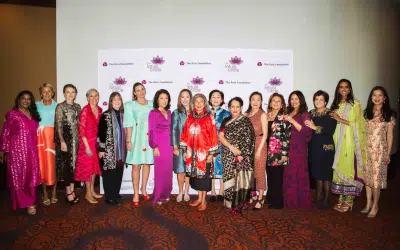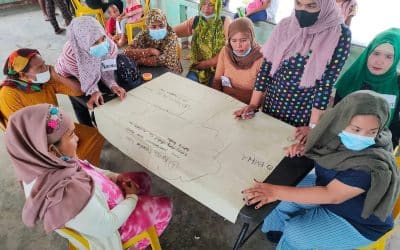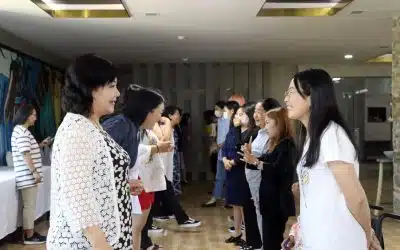InAsia
Insights and Analysis
Young ASEAN Leaders Reimagine the Workforce of the Future
June 23, 2021
On the Precipice
On Saturday May 22, 61 young leaders from ASEAN and Timor-Leste faced whipping winds and freezing temperatures en route from Everest Base Camp to the summit. Maral Dipodiputro, a lawyer turned social entrepreneur from Indonesia, was leading her group of five when they found two stuck climbers blocking their ascent. They faced a critical decision: to wait, wasting precious oxygen and risking frostbite, or to send the three weakest team members back, redistribute the oxygen, and give the remaining members a fighting chance to reach the top.
Maral and the other teams grappled repeatedly with decisions like this over the course of a two-hour, immersive video training, “Explore Performance,” a program for “highly aligned and empowered teams” operating in volatile, uncertain, complex, or ambiguous (VUCA) environments, led by human-powered explorer and team decision-making coach Grant “Axe” Rawlinson. It was just one part of a packed week of skills-building workshops, interactive talks, fireside discussions, panels, lightning talks, gameplay activities, and addresses at the 2021 YSEALI Workshop on Future Workforce, hosted by the U.S. Embassy Singapore and implemented by The Asia Foundation’s Leadership and Exchange Programs unit with support from the American Chamber of Commerce in Singapore. The Young Southeast Asian Leaders Initiative (YSEALI), a program of the U.S. Department of State, is dedicated to leadership development of youth in the region.

Human-powered explorer Grant “Axe” Rawlinson led a simulated climb of Everest to teach critical team decision-making.
For eight rigorous days in mid-May, participants from 11 different Southeast Asian countries worked virtually with 73 experts from across Asia and the globe. They toured Singapore-based U.S. companies, including Google, Mastercard, Microsoft, Accenture, and the American Chamber of Commerce, and studied “foresight and futures thinking” in custom coursework from the Institute for the Future in Palo Alto, California. Hosted on the interactive conference platform Hopin (“hop in”), the program explored the challenges and opportunities of the Fourth Industrial Revolution (4IR) with some of the world’s leading experts. The platform was buzzing with activity at almost all hours of the day.
We live in a time of rapid change, and the workforce of the future needs to be reimagined for the new century. The YSEALI workshop brought these competitively selected young Asian leaders together to address digital transformation and hone their leadership skills—skills like agility, resilience, collaboration, and emotional intelligence that they will need if they’re to harness the coming changes and drive inclusive development in the region. Whether the precipice is an icy Everest or the looming transformation of work, Maral now understands that even the young and tech-savvy need the “mindset and mentality” to embrace change. “It’s skills like these that the workshop really helped with,” she says.

Maral Dipodiputro with MC Stacey Choe interviews Su-Yen Wong, 4IR expert.
“Solution Circles” and a Regional Network
A centerpiece of the program was the Solution Circle project groups, in which participants drew from their week of training to tackle some of today’s great challenges—sustainability and global health, digital transformation and human workplaces, inequality and talent, and trust—through the lenses of Organizations and Systems or People and Individuals. The teams were trained in the virtual collaboration tool MURAL and met each day to discuss their issue and hammer out potential solutions. The experience was facilitated by Michael Jenkins, CEO and cofounder of Expert Humans, and Diana Wu David, founder of Future Proof Lab, and each group was joined by a professional mentor skilled in their thematic area. By the end of the week, the participants had created exceedingly impressive presentations. These included a roadmap for digital transformation that fosters public-private partnership to push for an inclusive future workforce, a work-study program designed to upskill women workers and tackle systemic educational inequality, and a winning team that designed a grassroots learning platform to prepare young people to promote skills development in their communities.
The program emphasized collaboration and network-building across the region. “This is one of the best training programs I’ve been part of either virtually or in person, not only because of the well-planned material, but also because of the people,” says Maral. “We are so diverse in age, culture, background, education, and work experience, and everyone in their world is an alpha at what they’re doing. Everyone had great teamwork skills and respected each other’s opinion. We immediately understood how each other worked. We used our national flags [in our presentations] to emphasize that we came from different countries, and we used that strength to approach a solution. We used the insight that we gathered from our different experiences.”
Her Solution Circle group stays in touch via WhatsApp, and the Indonesian participants have already had reunion meetings. “Despite the fact we could not meet in person,” Maral adds, “we know these are friendships we will keep.”

Facilitators from career consulting firm My Working Title lead a virtual board game, Career SUPERDRIVE.
A “Futures Thinking” Mindset
Maral embodies the leadership mindset for the future of work. Three years ago, she left her job as a lawyer to start her own social venture, TEMU, which helps companies recruit low-skilled workers to solve poverty and employment issues in Indonesia. Shortly afterward, she learned she had cancer and had to put her initiative on hold. She says it was the YSEALI workshop that helped her realize that this hurdle equipped her with important future-of-work skills: self-care and resilience. “The YSEALI workshop gave me a lot of confidence and optimism. I know I am ready to face 4IR.”
Maral applied to the program to find solutions for the workers she supports. “We know that to equip low-skilled workers for 4IR we need to teach soft skills,” she says, “so how do we transfer this knowledge to a massive number of people rapidly?” A common theme among the workshop speakers and facilitators, she notes, was that solutions have to start with leaders like herself. The training she received over the course of the week significantly shifted Maral’s commitment to her own leadership development and to bringing new thinking to her colleagues and her community. “I’m now more optimistic. My approach now is to go to my colleagues and friends and highlight the concept of ‘cognitive skills’—these have been my big words since the workshop ended.”

Participants and mentors celebrate at the closing session of the program.
Skills for the Future
The day after the workshop, Maral received a phone call from the Indonesian government, asking her to lead the Youth20 component of the G20 Summit in Indonesia next year. She will help prepare issue notes and shape proposals for the G20 at large. She says that it was the power of positive thinking, as a result of the workshop, that helped her accept the challenge. “When the offer came, I was very positive and confident. I knew that the biggest challenge for the G20 is considering how we improve employment and the economy because of Covid and 4IR, and I have all the skills that are needed for that. It’s amazing how this all fell into place.”
But she’s not stopping there. She recalls playing the virtual board game “Career SUPERDRIVE” on the first day of the program, facilitated by the career consulting company My Working Title to help participants draft career strategies in an age of disruption. “During the game I said I want to be the president of my country,” she says with a delicate balance of vision and humility. “I honestly think it’s my calling. … I very much believe that the leadership skills I got through this program have helped me realize the importance of answering my calling.”
Clinging to ropes on an Everest precipice, Maral decided not to break up the team. They ultimately reached the summit.
Nicole Ripley is senior program officer in the Leadership and Exchange Programs unit of The Asia Foundation. She can be reached at [email protected]. The views and opinions expressed here are those of the author, not those of The Asia Foundation.
About our blog, InAsia
InAsia is posted and distributed every other Wednesday evening, Pacific Time. If you have any questions, please send an email to [email protected].
Contact
For questions about InAsia, or for our cross-post and re-use policy, please send an email to [email protected].The Asia Foundation
465 California St., 9th Floor
San Francisco, CA 94104
The Latest Across Asia
Program Snapshot
May 2, 2024
News
April 25, 2024
Program Snapshot
April 18, 2024

2024 Lotus Leadership Awards
The Lotus Leadership Awards recognize contributions towards gender equality in Asia and the Pacific







0 Comments